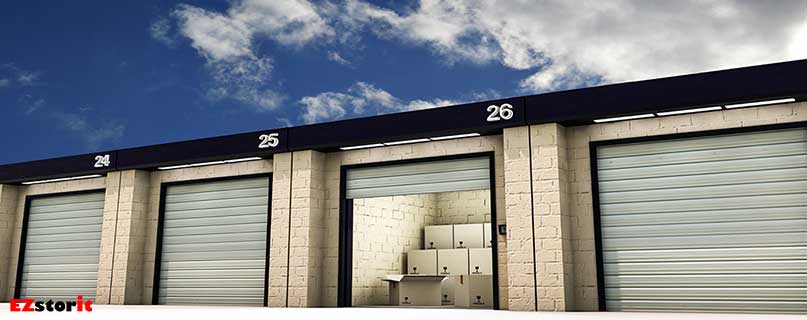Feb
07
Scaling Up: Transitioning from Self-Storage to Professional eCommerce Fulfillment
07

In an era where eCommerce has become the backbone of retail, the dynamics of how businesses manage their inventories and fulfill customer orders have dramatically evolved.
Initially, the convenience and cost-effectiveness of using self-storage spaces appeal to many budding entrepreneurs. However, as these businesses blossom, the necessity for more advanced and scalable eCommerce fulfillment services becomes unmistakably clear.
We’ll get into the transformative journey from utilizing self-storage for eCommerce to embracing professional fulfillment services. For this, it’s crucial to consider whether you want to use a fulfillment center or a warehouse.
The Early Stages of eCommerce Business
The inception of an eCommerce venture is often marked by humble beginnings, where personal storage spaces or units play a pivotal role. Platforms like EZstorit have witnessed many small businesses taking their first steps in such modest settings.
This approach offers undeniable benefits for new and small eCommerce businesses, primarily the flexibility to start and scale without the burden of heavy initial investments. Using a self-storage eCommerce fulfillment process allows for direct control over inventory and operations, providing a hands-on learning experience for entrepreneurs.
Despite its advantages, relying solely on personal storage space for eCommerce business operations comes with its set of limitations. As the business expands, the storage space once sufficient for inventory storage quickly becomes inadequate.
The lack of sophisticated tools for inventory management and the manual process of handling orders start to hinder efficiency, pointing towards the need for a more structured approach.
Challenges Faced in Scaling Up
With growth, eCommerce businesses encounter a new set of challenges that self-storage solutions are ill-equipped to handle. This makes the in-house fulfillment process incredibly difficult including the following:
• Inventory management – This becomes hard to handle as spaces can full up quickly.
• Logistics – They quickly turn into a never-ending list of inefficiencies.
• Customer demand – It becomes harder to meet customer expectations as demand escalates beyond what self-fulfillment processes can satisfy.
As a result, the personal touch that self-storage facilities offer start to falter under the pressure of scaling up. This can lead to potential delays in shipping, inventory inaccuracies, and a strain on customer satisfaction.
The limitations of self-storage in managing the logistical requirements of a growing eCommerce business become more apparent. The need for a solution that can seamlessly adapt to increasing order volumes, manage stock across multiple channels, and ensure timely delivery to customers is crucial for sustaining growth.
Introduction to eCommerce Fulfillment Services
Using professional eCommerce order fulfillment services marks a turning point for growing eCommerce businesses. These services offer a lifeline, equipped to tackle the complexities of inventory management, logistics, and customer service with ease.
By outsourcing logistics to fulfillment experts like James and James, businesses can leverage large-scale inventory management, expedited shipping options, and cutting-edge technology for tracking and managing orders. Professional fulfillment services act as the backbone of eCommerce operations, allowing businesses to expand their reach without the logistical nightmares.
They provide a scalable order fulfillment infrastructure that supports growth. This enables businesses to focus on marketing, customer engagement, and product development rather than getting bogged down by operational challenges.
The Benefits of Professional Fulfillment Services
Embracing professional fulfillment services comes with a load of benefits that can revolutionize how an eCommerce company operates. These include:
• Efficiency and scalability – The eCommerce order fulfillment process is designed to handle fluctuations in order volume seamlessly. This scalability ensures that businesses can grow without the fear of logistical constraints.
• Cost-effectiveness – Fulfillment services often have the scale to negotiate better shipping costs, streamline inventory management, and optimize the distribution process, resulting in lower operational costs.
• Customer satisfaction – The ability to offer faster, more reliable shipping enhances the customer experience, fostering loyalty and encouraging repeat business.
Making the Transition
The decision to transition from self-storage to a fulfillment center is monumental and requires careful planning. The first step is to identify potential eCommerce fulfillment partners that align with your business model, values, and growth aspirations.
Understanding the cost implications and how they stack against current expenses is vital to ensure the transition is financially viable. Integration with existing eCommerce platforms is another critical consideration. The cost of an eCommerce fulfillment service can vary, depending on whether they offer inventory management software, warehouse space, and your monthly order volume.
Seamless integration ensures that the switch to an eCommerce fulfillment provider is smooth and does not disrupt the customer experience. Businesses should also evaluate the level of support provided by the fulfillment service, ensuring they have access to real-time data and insights into their inventory and order status.
As you continue to scale up, you should consider whether it’s best to use multiple locations, while still maintaining to meet customer expectations. After all, it’s no point having loads of warehouse space if your customer demand and online orders are slowing down.
That’s where using the best eCommerce fulfillment partners come in handy. For example, James and James optimize their entire fulfillment process with third party logistics (3PL) and a top-notch inventory management system.
Final Thoughts
The journey from leveraging self-storage for eCommerce operations to partnering with a professional fulfillment service is a sign of a business's growth and evolution. This transition not only addresses the logistical challenges faced by expanding businesses but also sets the stage for sustainable growth, efficiency, and enhanced customer satisfaction.
For eCommerce companies at the crossroads of growth, considering a shift to professional fulfillment services could be the key to unlocking new levels of success. By embracing the expertise and infrastructure offered by these services, businesses can navigate the complexities of scaling up with confidence.
By: Jamie Irwin





